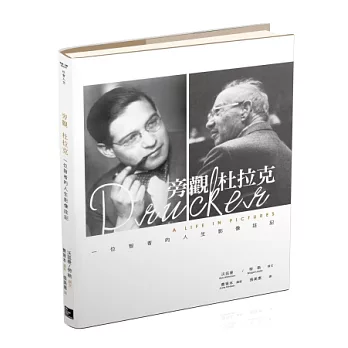, Box 8, Folder 7, The Drucker Institute Archives, Claremont, California.
1968.12.9
Correspondence from James M. Hester to Peter Drucker, 1968-12-09
1960s
Receives the Presidential Citation at New York University, the highest award given by the university.
2. 1972.7.25 Drucker to Jim and Milie
Drucker 說搬到加州洛杉磯東40哩的 Claremont....不想加入史丹佛大學商學院,因該校要求全職教學,而Drucker 對該校也不覺合口胃。Drucker 答應NYU每年公開演講3次 (4月,以Distinguished University Professor 名義。這是在University Professor之前加形容詞。)
3. 從1972.7.25 上信可知Drucker 可讀日文。他太太Doris是日本專利轉成美國專利的總代理。她在80歲還新設公司賣會議麥克風聽力偵測器......
今天才知道Peter Drucker 夫人晚年寫的德國童年回憶錄: By the time we were born, fashions had changed, and women were encouraged to breast-feed their babies. My mother went at it vigorously because, as she told me later, "I wanted to override the bad genes your father has contributed to your existence."
An excerpt from Invent Radium or I'll Pull Your Hair: A Memoir by Doris Drucker. Also available on web site: online catalogs, secure online ordering, excerpts from new books. Sign up for email notification of new releases in your field.

旁觀:從不同角度看,並反覆思考
百張照片
註記杜拉克的不同角色
移民、作家、老師、顧問、朋友、丈夫
打字機、博士論文、手杖與唱片收藏
威爾許的親筆信、日本天皇頒贈的獎狀、FBI的調查檔案……
從可見,觀察尚未被看見的杜拉克
杜拉克生於 1909 年 11 月 19 日,在奧地利長大,17 歲前往德國。1933年納粹掌權,杜拉克一些早期作品遭禁並被焚毀,他遂逃往他國。杜拉克目睹祖國制度一一崩壞,認定「捨棄專制的另一條路是實踐負責的管理」。1937 年與妻子移民美國──管理實務的發展史從此改寫。
本書旨在禮讚「管理學發明者」杜拉克的一生與成就。他是一位多產的作家、熱情的老師、高明的顧問──對組織經營的影響力,縱觀 20 世紀無人能出其右。
書中收錄近百幀精采相片,包括書信、文稿、獎項、私人信札、生活物品等相片,如:杜拉克探討國際法的博士論文、威爾許(Jack Welch)的親筆信、日本天皇致贈的至高榮譽、杜拉克的打字機、他的手杖與唱片收藏、聯邦調查局的杜拉克檔案……等,很多是首度公諸於世。
每一張圖像,都呈現了杜拉克人生中的不同角色:逃離納粹德國的移民、暢銷作家、深受學生愛戴的教授,以及大企業、非營利組織、政府機構的顧問等。讓我們得以親近杜拉克漫長、精采、極具影響力的一生。
除了相片,還穿插杜拉克本人多年來受訪的內容節錄,以及杜拉克研究院執行董事沃茲曼的詳細圖說,鮮活突顯每張圖像的意義。
這本獨特的精美相片史書,宛如探照燈般,讓我們見證 20 世紀極具影響力大師一生中的許多面向。以本書為 20 世紀的管理大師致敬,再恰當不過。
作者簡介
【撰文】瑞克.沃茲曼(Rick Wartzman)
擔任《華爾街日報》(Wall Street Journal)與《洛杉磯時報》(Los Angeles Times)記者、編輯、專欄作家 20 年,現為克萊蒙大學杜拉克研究院(The Drucker Institute, Claremont Graduate University)執行董事,也是《富比世》雜誌網站專欄作家。編著有《杜拉克跨世講堂》(The Drucker Lectures),以及集結專欄而成的《杜拉克會怎麼做?》(What Would Drucker Do Now?)。
【撰文】布莉姬.勞勒(Bridget Lawlor)
克萊蒙大學檔案研究與歷史碩士,目前在該校攻讀博士,並為杜拉克研究院檔案室保管人。
【攝影】安.費胥本(Anne Fishbein)
備受肯定的攝影師,作品獲多家重要機構收藏,包括芝加哥藝術學院美術館(Art Institute of Chicago)、洛杉磯美術館(Los Angeles County Museum of Art)、紐約現代藝術博物館(Museum of Modern Art)、舊金山美術博物館(San Francisco Museum of Fine Art)、加拿大國家美術館(National Gallery of Canada)、法國涅普斯博物館(Musee Niepce)等。曾出版俄國攝影書《返鄉之路》(On the Way Home)。
譯者簡介
張美惠
臺大外文系畢,輔大翻譯研究所肄業,現從事專職翻譯。曾獲梁實秋文學獎譯詩組佳作,譯作《Y染色體:男子漢的本質》獲第三屆吳大猷科普著作獎(翻譯類佳作獎)。譯有《EQ》、《綠色EQ》、《破壞性情緒管理》、《Wealth 3.0──托佛勒 財富革命》、《你的桶子有多滿?》、《我願意陪伴你》等書。
目錄
前 言
移民∕The Immigrant想知道我的故事?我在 20 歲生日那天成為記者,在歐洲第二大午報擔任國外與商業編輯,1 月 2 日去報到。
作家∕The Writer我一直都說自己在寫作,是一種嚴重、退化性的強迫症和成癮症。
老師∕The Teacher教學從來不是我的職業,而是我的嗜好。我熱愛教書,但從來沒把它當職業,只是讓自己滿足。
商業顧問∕The Business Consultant我很早就被教導必須先診斷再開刀,診斷後十有八九是不必開刀的。
政府顧問∕The Government Consel就像所有的事情,我從來沒有積極追求什麼,都是事情找上我。這件事也不例外,
公益組織顧問∕The Social-Sector Advisor嗯,我在非營利組織影響最大,很可能的原因是,長期以來那些組織就只有我一個人投入。
世事通達∕A Man of the World我們犯了一個嚴重錯誤,應該在1960年代把存款都領出來,能借的盡量借,全部拿去買日本畫。現在我們買不起了。
愛家惜友的棒球迷∕Family Man, Friend, and Fan我想「快樂的人」不是最恰當的用詞,應該說,我所認識的對人生滿足的人……通常不會只活在一個世界。
影響∕The Drucker Legacy我不去想那件事。我被教導不應該去想那件事。我的本分是,時候到了便坦然接受。
圖片來源及參考文獻
杜拉克生平
杜拉克著作表
杜拉克研究院簡介
前言
杜拉克一向喜歡以局外人自居──他自己的用語是「旁觀者」(bystander)。
他寫道:「旁觀者沒有自己的歷史,雖站在舞台上卻未參與演出,甚至也不是觀眾。戲劇與劇中每位演員的優劣由觀眾評斷,而旁觀者的反應只對自己有影響。但旁觀者站在舞台的兩側,跟戲院裡的消防員一樣,所以看事情的角度又不同於演員或觀眾。旁觀者會反映事物,像三稜鏡而不像鏡子,因而事物會折射。」
杜拉克擁有超凡的觀察力──這一點應該沒有人有異議。他自己的描述是:「能夠望向窗外,看到可見但尚未被看見的事物。」杜拉克在幾乎還沒有任何人發現之前,便已觀察到 20 世紀一些最重要的趨勢與事件:包括希特勒與史達林的協議、日本經濟力崛起、從製造走向知識工作的轉型、服務業日益重要,蘇聯崩解等。哈佛商學院教授肯特(Rosabeth Moss Kanter)曾讚嘆:「杜拉克的眼睛裡一定有水晶球。」
杜拉克自稱只是旁觀者,其實一點都不正確;他絕不只是站在舞台兩側而已。70 年來,他參與很多演出,且常常是主角,或導演,或編劇,或編導演一體。
本書收錄很多圖片,由克萊蒙大學杜拉克研究院(The Drucker Institute, Claremont Graduate University)的杜拉克檔案室(Drucker Archives)提供──突顯杜拉克一生中扮演的各種角色。包括 1930 年代逃離納粹的移民;老師;作家《大西洋月刊》(The Atlantic)資深編輯畢提(Jack Beatty)認為,他的豐富著作「產生的正面影響」,在過去 50 年裡可能無人能超越;為世界各地的企業、非營利組織、政府機構提供服務的顧問;體貼的丈夫、慈愛的父親與忠實的朋友。
我盡力為每幅圖像提供解說,呈現杜拉克一生中最重要的主題與事件,另外,書中還穿插杜拉克多年來受訪的內容節錄。
杜拉克也很喜歡對別人提出問題,其中最有洞察力的當然是這句:「你希望別人如何記得你?」如同本書清楚顯示的,世人將一直記得杜拉克為組織管理帶來正向深遠的影響,從而形塑了我們的社會。
但,本書並不是要以圖像撰寫權威性的傳記。很可惜,杜拉克檔案室的收藏不夠完整,根本不可能做這樣的嘗試。這主要得怪杜拉克本人,簡單來說,他不是那種什麼東西都要保留的人。
我不知道杜拉克為什麼不多保留一些信件和文件,想想,他丟棄與傳奇的通用汽車董事長史隆(Alfred Sloan)、發明家兼哲學家富勒(R. Buckminster Fuller)或傳播理論家麥克魯漢(Marshall McLuhan)的往來書信,真不知有多少豐富的歷史跟著流失!他與這三人(以及更多人)都有密切往來。
杜拉克不太執著於保留歲月的痕跡,我猜想有兩個原因。第一,他雖然善於向歷史借鏡,但也很堅持放眼未來。他曾為企業建言:「若不先拋開過去,就不可能創造未來。」第二,為後代保留過去的紀錄有種虛榮的成分,而杜拉克絕對不是自我意識強烈的人。
不過,杜拉克檔案室還是有很多文物可以為這個了不起的人物留下精采註記──超過 1 萬筆文件、相片、影片、獎項和教學用具。杜拉克檔案室於杜拉克 95 歲去世前 7 年(1998 年)正式成立,但非正式成立在更早之前。杜拉克的好友巴福德(Bob Budford,現任杜拉克研究院榮譽主席)做了一項很有智慧的投資:買了一些硬紙盒,開始將杜拉克車庫裡的東西找出來,以免發霉或是「被老鼠咬壞。」近年來,杜拉克的遺孀朵莉絲(Doris Drucker)繼續將家裡發現的東西交給檔案室。
最重要的,近來檔案室很積極在全國乃至全世界其他地方尋找杜拉克的遺物──其中不少新發現都收錄在本書之中。這要歸功於我們的檔案管理人羅勒(Bridget Lawlor)的聰明和熱情。她於 2009 年夏天加入杜拉克研究院,與筆者一起整理這本書。
我們寫作團隊的另一位成員是費胥本(Anne Fishbein),她的精采攝影為本書生色不少。她的才能無庸置疑,許多機構都曾收藏或展示她的作品:芝加哥藝術學院美術館(Art Institute of Chicago)、洛杉磯美術館(Los Angeles County Museum of Art)、紐約現代藝術博物館(Museum of Modern Art)、舊金山美術博物館(San Francisco Museum of Fine Art)等。
我們三人在撰寫本書時都非常樂在其中。過程中,杜拉克再度讓我們學會以新的角度思考自己的工作與生活,我們相信讀者也會有同樣的收穫。
沃茲曼(Rick Wartzman)
加州克萊蒙
Drucker: A Life in Pictures Hardcover – February 5, 2013
- Hardcover: 192 pages
- Publisher: McGraw-Hill Education; 1 edition (February 5, 2013)
- Language: English
A Photographic Celebration of the Life and Work of the Legendary Peter Drucker
Born on November 19, 1909, Peter Drucker grew up in Austria and moved to Germany at the age of seventeen. When the Nazis rose to power in 1933, they burned and banned some of Drucker's earliest writings, and he fled the country. As Drucker witnessed the institutions of his nation fall apart one by one, he concluded that "performing responsible management is the alternative to tyranny." In 1937, Drucker and his wife immigrated to the United States--and the practice of management has never been the same.
Drucker: A Life in Pictures celebrates the life and work of "the man who invented management," as Drucker was known. He was a prolific writer, a passionate teacher, and a brilliant adviser who influenced how organizations are run perhaps more than any single figure of the twentieth century. Drucker was also a loving husband and father, a loyal friend, and a passionate baseball fan.
Drawn from the Drucker Archives, a part of the Drucker Institute at Claremont Graduate University, this trove of photos captures Drucker in all facets of his life--as an immigrant fleeing Hitler's Germany, a bestselling author, a beloved professor, and a consultant to major corporations, nonprofits, and government agencies.
The images include Drucker's doctoral dissertation on international law; a handwritten note from General Electric's Jack Welch; a high honor bestowed upon Drucker by the Emperor of Japan; Drucker's typewriter; his walking stick and record collection; and the file the FBI kept on Drucker--along with other stunning photographs of his manuscripts, awards, personal letters, and other ephemera.
The book is framed by extensive captions written by Drucker expert Rick Wartzman, and also includes excerpts of interviews with Drucker himself. All told, this handsome, unique photo history shines a spotlight on the many sides of one of the twentieth century's most influential figures.
Drawn from the vast collection at the Drucker Archives, a part of the Drucker Institute at Claremont Graduate University, Drucker: A Life in Pictures features almost 100 photographs of Peter Drucker's correspondence, manuscripts, awards, personal items, and other ephemera. Much of it has never been seen before by the public.
Each picture provides a glimpse into Drucker's long, fascinating, and hugely influential life, with every image placed into context through extensive captions written by Rick Wartzman, the Drucker Institute's executive director. Interlaced through the book are excerpts from various interviews that Drucker gave over the years.
Drucker: A Life in Pictures is a fitting tribute to one of the most important minds of the twentieth century.

Peter Drucker to W. Edwards Deming
May 19, 1976
•Dear Ed:
•
•I am unhappy that I cannot join all your GBA friends at this reception to honor you at your retirement. I am too far away and will not be able to attend. But I do not want to let this occasion go by without conveying to you my very warmest wishes. You already were one of the stars and leaders at GBA when I joined the faculty in 1950. And from the beginning, I looked to you and to a few of the seniors of the time for inspiration, for guidance, and above all for standards. What I have learned from your example is beyond measurement - and cannot possible be sampled, not even unscientifically. But the example you gave all of us - in your concern for the individual student; in your kindness towards the new and young faculty member; and in your complete uncompromising integrity of standards and insistence on principle - was inspiration, guidance, and a constant source of renewals for me and of pride in being privileged to be associated with you.
•
And so I am joining with all your friends, students and admirers today in wishing you the very best for your retirement - I know it will be an active one, a productive one, and I hope a healthy and a very long one. If only I were good enough to write a Canticle of Praise and Thanksgivings (sic) for William Edwards Deming.
•
In old friendship,
•
As always, yours, Pt (signed)
----- 一封信的國際討論8.25.1952
你好我親愛的朋友們,
我保持與Hanching湧,編輯在台灣,這在中國發行的HDC和TNE長期的合作關係。他送我從彼得·德魯克以驚人的信德明於1976年。你知道,德魯克是MBO的發明者和理論家。你知道1975年左右(我忘了確切的日期),他寫了一本書,糾正了他以前的書的規則通過引入領導。這兩人知道對方很好,因為兩人都是教師,在紐約大學。
此致
Bonjour mes chers amis,
J’entretiens depuis longtemps une relation avec Hanching Chung, éditeur à Taiwan, qui a publié HDC et TNE en chinois. Il m’a envoyé une lettre étonnante de Peter Drucker à Deming en 1976. Vous savez que Drucker était l’inventeur et le théoricien du MBO. Vous savez que vers 1975 (j’ai oublié la date exacte) il a écrit un livre qui corrigeait les règles énoncées dans ses livres précédents en introduisant le leadership. Les deux hommes se connaissaient bien car tous deux étaient enseignants à l’université de New-York.
Amicalement
Hello my dear friends,
I maintain a long relationship with Hanching Chung, editor in Taiwan, which issued HDC and TNE in Chinese. He sent me an astonishing letter from Peter Drucker in Deming in 1976. You know that Drucker was the inventor and theorist of MBO. You know around 1975 (I forget the exact date), he wrote a book which corrected the rules in his previous books by introducing leadership. The two men knew each other well because both were teachers at the University of New York.
Sincerely
-----
O Most High, all-powerful, good Lord God,
to you belong praise, glory,
honour and all blessing.
Be praised, my Lord, for all your creation
and especially for our Brother Sun,
who brings us the day and the light;
he is strong and shines magnificently.
O Lord, we think of you when we look at him.
Be praised, my Lord, for Sister Moon,
and for the stars
which you have set shining and lovely
in the heavens.
Be praised, my Lord,
for our Brothers Wind and Air
and every kind of weather
by which you, Lord,
uphold life in all your creatures.
Be praised, my Lord, for Sister Water,
who is very useful to us,
and humble and precious and pure.
Be praised, my Lord, for Brother Fire,
through whom you give us light in the darkness:
he is bright and lively and strong.
Be praised, my Lord,
for Sister Earth, our Mother,
who nourishes us and sustains us,
bringing forth
fruits and vegetables of many kinds
and flowers of many colours.
Be praised, my Lord,
for those who forgive for love of you;
and for those
who bear sickness and weakness
in peace and patience
- you will grant them a crown.
Be praised, my Lord, for our Sister Death,
whom we must all face.
I praise and bless you, Lord,
and I give thanks to you,
and I will serve you in all humility.
Canticle of Praise and Thanksgivings
https://soundcloud.com/jim-hughes-1/canticle-of-praise-and
Canticle of Praise and Thanksgiving by Jim Hughes
This hymn of praise celebrates the many places we find Christ in our lives. I first used it at our Easter vigil mass but it is appropriate during most times during the church year as well as confirmation and other sacramental celebrations. © 2013 by ILP Music and Jim Hughes
Canticle of Praise
https://www.youtube.com/watch?v=VIOR3vYE3Y4
Canticle of Praise
© April 23, 2006
Author: John Ness Beck
As a father pitieth his children, so the Lord pitieth them that fear Him.
For He knoweth our frame; He remembreth that we are dust.
As for man, his days are as grass; as a flower of the field, so he flourisheth, for the wind passeth over it, and it is gone, gone, gone, gone, gone; and the place thereof shall know it no more.
But the mercy of the Lord is from everlasting to everlasting to them that fear Him, to such as keep His covenants.
The Lord hath prepared His throne in the heavens, and His kingdom ruleth over all.
Praise ye the Lord! Praise ye the Lord from the heavens! Praise Him in the heights! Praise ye Him, all His angels, praise ye Him, all His hosts.
Praise ye Him, sun and moon, praise Him, all ye stars of light. Praise the Lord from the earth, ye dragons, and all deeps: Fire and heal; snow and vapours; stormy wind fulfilling His word!
Kings of the earth, and all people, princes and all judges of the earth, young men and maidens, old men and children, let the praise the name of the Lord!
For His name alone is excellent, His glory is above the earth and heaven.
Praise ye the Lord!
Praise ye the Lord!
Praise ye the Lord!
Praise ye the Lord!
A canticle (from the Latin canticulum, a diminutive of canticum, "song") is a hymn, psalm or other song of praise taken from biblical texts other than the Psalms.
旧約聖書の雅歌に由来し、
詩編以外の
聖書から採られた
韻文詩による聖歌。 和訳では「雅歌」あるいは「頌歌」。 歌い方は
ディレクトと呼ばれる直行唱で、以下のように
聖務日課の幾つかの課で決められたものが歌われる。
- 「賛課(Laudes)」:"Benedictus Dominus Deus" 「ベネディクトゥス・ドミヌス・デウス(主なる神をたたえよ)」 、通称「ザカリアのカンティクム」
- 「晩課(Ad Vesperam)」:"Magnificat" 「マニフィカト」、通称「聖母マリアのカンティクム」
- 「終課(Completorium)」:"Nunc Dimitis" 「ヌンク・ディミティス(今こそ主よ、僕を去らせたまわん)」、通称「シメオンのカンティクム」










